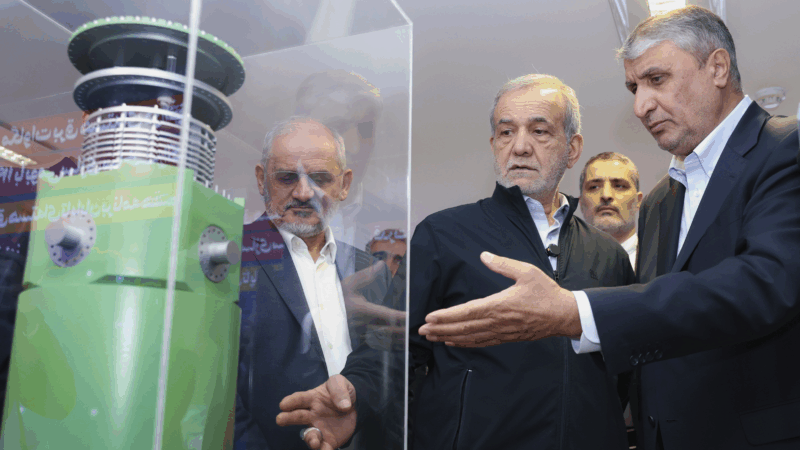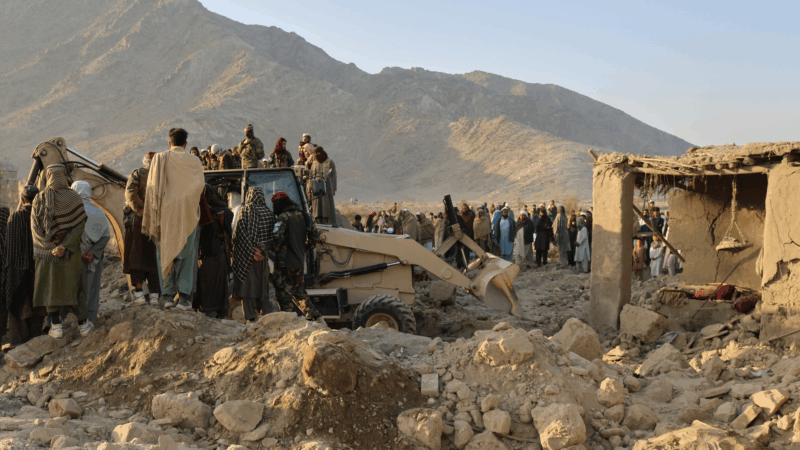Trump warns a strike on Iran ‘could very well happen’ if no nuclear deal is signed
President Trump warned Thursday that a “massive conflict” could break out in the Middle East over the issue of Iran’s nuclear program but said he wants a diplomatic resolution, after the United Nations’ nuclear watchdog found that Tehran had failed to comply with its nonproliferation obligations for the first time in two decades.
Trump has said recently that he has held Israel back from attacking Iran’s nuclear processing facilities, and threatened that if the current talks between the United States and Iran don’t curb the latter’s ability to enrich uranium, then military strikes are an option.
Asked if such strikes could be imminent, Trump told reporters, “Well, I don’t want to say imminent, but it looks like it’s something that could very well happen.”
“Look, it’s very simple, not complicated,” Trump said. “Iran cannot have a nuclear weapon. Other than that, I want them to be successful. I want them to be tremendous. We’ll help them be successful. We’ll trade with them. We’ll do whatever is necessary.”
He later wrote on social media, “We remain committed to a Diplomatic Resolution to the Iran Nuclear Issue!”
In a separate meeting with media, Trump explained why the State Department had begun to evacuate staff from its embassy in Baghdad, while the military has evacuated personnel not deemed essential from U.S. military bases in the Middle East. The U.S. has bases in the Persian Gulf that Tehran could target in the event of an attack.
“Look, there’s a chance of massive conflict,” Trump said. “We have a lot of American people in this area, and I said we got to tell them to get out, because something could happen soon. And I don’t want to be the one that didn’t give any warning and missiles are flying into their buildings. It’s possible. So I had to do it.”
Hours earlier, the International Atomic Energy Agency, which is based in Vienna and monitors Iran’s nuclear program, concluded that Iran was not in compliance with its obligations to report all activities in its nuclear facilities. The U.N. watchdog said in a resolution that Tehran “did not declare nuclear material and nuclear-related activities at three undeclared locations in Iran,” so the agency could not determine “whether the nuclear material at these undeclared locations in Iran has been consumed, mixed with other declared material, or is still outside of Safeguards.”
Iran’s response was defiant. Its Foreign Ministry condemned the resolution as “highly political” and announced it was “launching a new enrichment facility in a secure location,” which it did not disclose.
The flurry of announcements caused a spike in regional tensions and came as Trump’s Middle East envoy, Steve Witkoff, prepares for a sixth round of talks with an Iranian delegation in Oman on Sunday. Oman and Witkoff’s office both said the talks were still on track. The different negotiating teams have reported some progress in the talks, but the question of whether Iran should be allowed to enrich some uranium for civilian purposes, such as power plants, has become a sticking point. Iran insists on its right to process the material to a lower grade than is needed to build a weapon, but Trump has said on his social media site that he “will not allow any enrichment of uranium.”
Israel has insisted Iran’s entire nuclear infrastructure needs to be dismantled before it’s able to build a bomb, which Israel deems an existential threat in the hands of its arch foe.
Israeli Foreign Ministry spokesman Oren Marmorstein said on Thursday that “Iran has engaged in a systematic clandestine nuclear weapons program. It is rapidly accumulating highly enriched uranium, clearly proving the nature of the program is for non-peaceful purposes.”
He added that “the international community must respond decisively to Iran’s non-compliance and take measures to prevent Iran from developing nuclear weapons.”
“It’s a white-knuckled wait until the sixth round of talks in Oman,” Holly Dagres, an Iran expert at the Washington Institute for Near East Policy, said in a statement.
She explained that Tehran hasn’t formally rejected the U.S. proposal but the Iranian supreme leader has expressed his opposition in a recent speech.
“It’s unclear how much patience Trump has for the Iranians, who are known to be masterful time-wasters,” she added. “That said, Trump remains wary of being dragged into a ‘forever war,’ and U.S.-led strikes on nuclear facilities would not sit well with his isolationist base.”
Ukraine’s combat amputees cling to hope as a weapon of war
Along with a growing number of war-wounded amputees, Mykhailo Varvarych and Iryna Botvynska are navigating an altered destiny after Varvarych lost both his legs during the Russian invasion.
University students hold new protests in Iran around memorials for those killed
Iran's state news agency said students protested at five universities in the capital, Tehran, and one in the city of Mashhad on Sunday.
Pakistan claims to have killed at least 70 militants in strikes along Afghan border
Pakistan's military killed at least 70 militants in strikes along the border with Afghanistan early Sunday, the deputy interior minister said.
Team USA faces tough Canadian squad in Olympic gold medal hockey game
In the first Olympics with stars of the NHL competing in over a decade, a talent-packed Team USA faces a tough test against Canada.
PHOTOS: Your car has a lot to say about who you are
Photographer Martin Roemer visited 22 countries — from the U.S. to Senegal to India — to show how our identities are connected to our mode of transportation.
Looking for life purpose? Start with building social ties
Research shows that having a sense of purpose can lower stress levels and boost our mental health. Finding meaning may not have to be an ambitious project.






